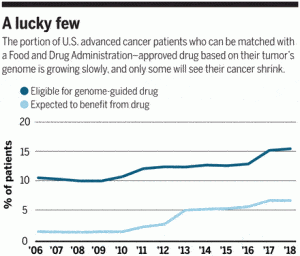Jocelyn Kaiser in Science:
 For people with advanced cancer who are running out of options, many cancer centers now offer this hope: Have your tumor’s genome sequenced, and doctors will match you with a drug that targets its weak spot. But this booming area of cancer treatment has critics, who say its promise has been oversold. Last week, two prominent voices in the field faced off in a sometimes-tense debate on what’s often called precision oncology at the annual meeting of the American Association for Cancer Research (AACR) in Chicago, Illinois. Their dispute threw a splash of cold water on a meeting packed with sessions on genome-based cancer treatments.
For people with advanced cancer who are running out of options, many cancer centers now offer this hope: Have your tumor’s genome sequenced, and doctors will match you with a drug that targets its weak spot. But this booming area of cancer treatment has critics, who say its promise has been oversold. Last week, two prominent voices in the field faced off in a sometimes-tense debate on what’s often called precision oncology at the annual meeting of the American Association for Cancer Research (AACR) in Chicago, Illinois. Their dispute threw a splash of cold water on a meeting packed with sessions on genome-based cancer treatments.
On one side was David Hyman, a 30-something oncologist at Memorial Sloan Kettering Cancer Center in New York City and a leader of clinical studies testing gene-targeted cancer drugs. Genomics won’t help most cancer patients at this point, he acknowledged, but many do clearly benefit: “I think this is certainly not hype,” Hyman said. Countering Hyman was another young oncologist, Vinay Prasad of Oregon Health & Science University in Portland, a prolific author of provocative journal articles and outspoken Twitter commentator with more than 17,000 followers. Prasad dispenses sharp criticism about various issues in medicine, from drug prices to conflicts of interest. In the case of precision oncology, he argues that far fewer patients will benefit than proponents suggest. “When you look at all of the data, it’s a sobering picture,” he said.
Targeted drugs for cancer date back to Herceptin, approved for breast cancer in 1998, and the 2001 approval of the leukemia drug Gleevec, both of which have saved many lives. So far, the U.S. Food and Drug Administration (FDA) has approved 31 targeted therapies for various cancers. Like Gleevec, most work by blocking mutant cancer-driving proteins, although one type harnesses the immune system to fight tumors.
More here.
